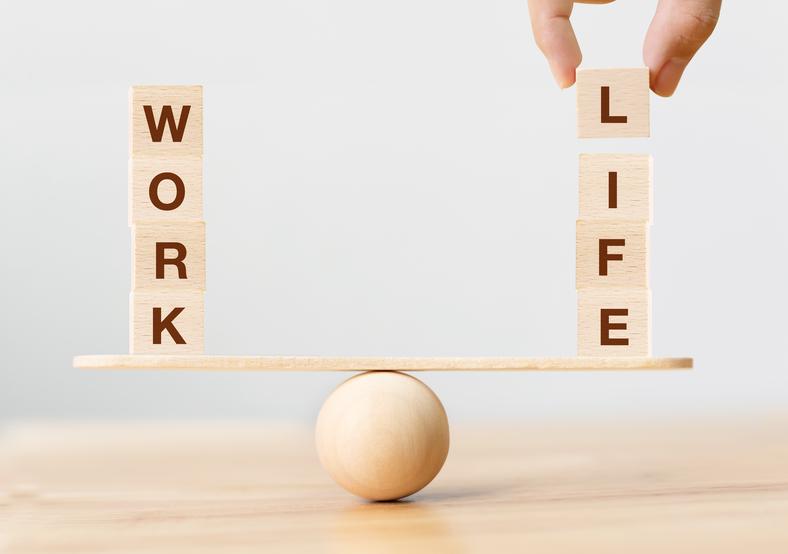Importance of Work-Life Balance and How To Achieve it
What is Work-Life Balance?
Work-Life balance is a subjective measure of your dual satisfaction about personal and professional life. Besides the time spent for both, this includes how one is affecting the other and also you.
To get the idea, answer the following question to yourself:
The answer is highly personal. Some may prioritize their family while others prefer and enjoy their profession. The key is to find the balance that fits you.

What to consider as “work”?
Your time spent working is obvious, but there is a lot more to this. You should factor in all the time you spend commuting or other work-related activities. Like checking your emails, thinking about a task you need to complete.
Time is not the only measure. You should factor in all the negative emotions and effects of your profession. Stress, worries, anxiety, and exhaustion all negatively affect your personal life.
What to consider as “life”?
Work earns you income that allows you to live. This money gives you security and satisfies your physiological needs. On top of this, it lets you build your relationships, family, and do all the things you enjoy. In general, everything that is positive, joyful, or makes you happy counts towards life.
You should also consider other positives of your profession. Like progress, achievements, recognition, encouragement, and friendships. Each workplace is also a community that has all the social upsides you should also factor in.
Compare your “work” and “life”
The balance can not be measured in hours or any kind of scoring. It is subjective and personal. It may even change with time as your priorities shift. This is why you should think about it from time to time.

To put everything on an emotional scale, you should collect all the positives and negatives. Take your time, think about all the aspects of your life that are affected by your profession.
As a result, you will find out if you are satisfied with your current situation or not. If you’re not, we will give you some advice below that can help you compensate for the imbalance.
Why is work-life balance important for you?
From a naive perspective, the no work would be the ideal state. It’s important to see that work is an essential part of our lives that allows us to enjoy our life. Your work has it’s own upsides as we discussed above, but it is also required for your living. No work would lead to less or even no life. That’s why balance is important.
Going on a long vacation is much more enjoyable because you worked hard for it. The effort heuristic is real.
Why is work-life balance important for employers?
You may ask: why would an employer care about its employees’ work-life balance? Simply because balanced employees are more productive, and less prone to burnout.
Dissatisfied employees are less productive and have a higher turnover rate. Unproductive working hours, recruitment, onboarding and lost productivity costs a lot. It makes sense even from a capitalistic view to investing in work-life balance.
Consequences of imbalance
Suffering from the imbalance from the “work” side can make your life bitter. You may have no time or energy to enjoy the delights of your personal life. Stress and tiredness may make you frustrated that can make your work even worse. It’s important to prevent this from escalating.

Ditching work to live your life may sound good. Raising your kids as a full-time “job” may be as satisfying as a great profession. Though, those who don’t want to or can’t afford to leave their daily job can find meaning in their profession. Life without meaning is dissatisfying.
Responsibility of the employer
When it comes to the “work” side, employers certainly can have a high impact. They define your work environment, including the type and amount of work you need to do. They even choose your colleagues by hiring them.
The actual work you have to do highly influences you. It can be stressful and exhausting when it does not fit or overwhelms you. With proper management and by paying attention they can improve your experience.
Another highly influencing factor is the workplace’s community. The employer can build a proper corporate culture. Doing so helps employees to enjoy their work, socialize and feel connected.
Your own responsibility
Employers’ impact may seem huge, compared to what you can do on the “work” side. Fortunately, you have much more influence than you think. You can find and focus on something you really enjoy in your work. You can involve yourself in the community, or even start building it. The perception of the (im)balance is subjective, so you can change it by changing your attitude.
Living your life is only your own responsibility. Getting the best out of it may counteract all the negatives you experience in your work. You can eliminate time-consuming activities that do not contribute to your happiness. Instead, do things that are actually meaningful to you.
If you think the situation is not worth putting the effort into improving it, you may want a drastic change. You can consider changing your job or even your profession.
Actionable tips to achieve the balance
Changing your life or habits may not be quick or easy. You should start with small steps with clear and achievable goals.
Take your time to think about the ups and downs of your work and life.
Work-life balance has two sides. To improve the balance, you can change both sides.
How to improve “life”?
You may not consider changing your life to improve your work-life balance, but it’s a great way to do it.
Joys, delights, and great experiences can easily outweigh most negatives of your work. It’s equally or even more important to live a meaningful and satisfying life than your work.

Everybody’s life is unique, we can’t tell what you should do to improve your own life. Although, we collected some generic best practices:
- Replace meaningless activities with meaningful ones. Eg.: watch fewer shows and spend quality time with your beloved ones.
- Sleep enough. Daily 7-8 hours of sleep is essential to your emotional well-being.
- Socialize, spend quality time with your friends and family. Share your experiences, thoughts, and feelings.
- Exercise regularly. Exercising is a great way to reduce stress and improve your mood. Eg.: take a walk every evening or cycle to work.
- Find time for yourself. You don’t have to dedicate all your time to others. Let yourself some alone time to think and explore your emotions.
How to improve “work”?
You may think that you have no impact on your work environment as it’s controlled by the employer. It’s definitely true, that you have lower control over it, but it’s not insignificant.
When you have no strong reason to switch jobs, you should put some effort into improving the current one. To do so, you can involve your employer, but there are a lot of things you can do alone. You can have a serious impact on your perception and the community:
- Appreciate your work and achievements. Even tiny results can make you feel better when recognized. It is even more effective when you mutually recognize these with your colleagues.
- Be kind to colleagues. Everyone has hard periods in their life. You may not even notice that a bit of your kindness means the world for someone. Their gratefulness will make your day a bit better.
- Get to know your colleagues. Friendships at the workplace can seriously improve your work-life balance. You can even gather after work and have a great time together. (5 things you could try)

You can also change your work-related habits:
- Try to keep your work out of your private life. Don’t check your emails or do work outside of working hours. Try to completely ignore work-related thoughts and problems outside of work.
- Find something that you really enjoy in your job and focus on that. Appreciate it each time you encounter it.
- Regularly take a break. Take a 1-minute walk in the office, stretch your muscles and drink some water. It’ll be refreshing to your body and mind. This can prevent exhaustion.
Changing the actual work environment is mostly the employer’s responsibility. Although, you can request and initiate the change. To do so, you need to give some feedback to the management and tell them about your initiatives. There are some ideas that are beneficial to you and also to the employer:
- Distribute workload more evenly across the company. Ask for help if you feel that you can hardly cope with all the tasks you need to complete.
- Reach out for tasks that fit you and your expertise. When you get a task you don’t think you are the appropriate one to do, at least tell them.
- Use the power of the team you work in. Ask and provide help, so you can tap into the benefits of teamwork. You will get help when you are stuck with something and you will feel good when you helped someone.
- Try to build the workspace community. Initiate the organization of team-building or social activities. You may even suggest some community-building tools, like Meestory.


